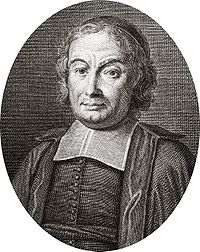
Louis Maimbourg
Encyclopedia

France
The French Republic , The French Republic , The French Republic , (commonly known as France , is a unitary semi-presidential republic in Western Europe with several overseas territories and islands located on other continents and in the Indian, Pacific, and Atlantic oceans. Metropolitan France...
Jesuit and historian
Historian
A historian is a person who studies and writes about the past and is regarded as an authority on it. Historians are concerned with the continuous, methodical narrative and research of past events as relating to the human race; as well as the study of all history in time. If the individual is...
.
Born at Nancy, Maimbourg entered the Society of Jesus at the age of sixteen, and after studying at Rome
Rome
Rome is the capital of Italy and the country's largest and most populated city and comune, with over 2.7 million residents in . The city is located in the central-western portion of the Italian Peninsula, on the Tiber River within the Lazio region of Italy.Rome's history spans two and a half...
became a classical master in the Jesuit college at Rouen
Rouen
Rouen , in northern France on the River Seine, is the capital of the Haute-Normandie region and the historic capital city of Normandy. Once one of the largest and most prosperous cities of medieval Europe , it was the seat of the Exchequer of Normandy in the Middle Ages...
. He afterwards devoted himself to preaching, but with only moderate success. After having taken some part in minor controversies he threw himself with energy into the dispute which had arisen as to the Gallican liberties
Gallicanism
Gallicanism is the belief that popular civil authority—often represented by the monarchs' authority or the State's authority—over the Catholic Church is comparable to that of the Pope's...
; for his Trait historique sur les prerogatives de l'Eglise de Rome (1682) he was by command of Innocent XI
Pope Innocent XI
Blessed Pope Innocent XI , born Benedetto Odescalchi, was Pope from 1676 to 1689.-Early life:Benedetto Odescalchi was born at Como in 1611 , the son of a Como nobleman, Livio Odescalchi, and Paola Castelli Giovanelli from Gandino...
expelled from the Society, but rewarded by Louis XIV
Louis XIV of France
Louis XIV , known as Louis the Great or the Sun King , was a Bourbon monarch who ruled as King of France and Navarre. His reign, from 1643 to his death in 1715, began at the age of four and lasted seventy-two years, three months, and eighteen days...
with a residence at the abbey of St Victor, Paris
Paris
Paris is the capital and largest city in France, situated on the river Seine, in northern France, at the heart of the Île-de-France region...
, and a pension.
His numerous works include histories of Arianism
Arianism
Arianism is the theological teaching attributed to Arius , a Christian presbyter from Alexandria, Egypt, concerning the relationship of the entities of the Trinity and the precise nature of the Son of God as being a subordinate entity to God the Father...
, the iconoclastic controversy, the Greek schism
Schism (religion)
A schism , from Greek σχίσμα, skhísma , is a division between people, usually belonging to an organization or movement religious denomination. The word is most frequently applied to a break of communion between two sections of Christianity that were previously a single body, or to a division within...
, Lutheranism
Lutheranism
Lutheranism is a major branch of Western Christianity that identifies with the theology of Martin Luther, a German reformer. Luther's efforts to reform the theology and practice of the church launched the Protestant Reformation...
, Calvinism
Calvinism
Calvinism is a Protestant theological system and an approach to the Christian life...
, and of the pontificates of Leo I
Pope Leo I
Pope Leo I was pope from September 29, 440 to his death.He was an Italian aristocrat, and is the first pope of the Catholic Church to have been called "the Great". He is perhaps best known for having met Attila the Hun in 452, persuading him to turn back from his invasion of Italy...
and Gregory I
Pope Gregory I
Pope Gregory I , better known in English as Gregory the Great, was pope from 3 September 590 until his death...
; they are mere compilations, written indeed in a very lively and attractive style, but inaccurate and untrustworthy.

